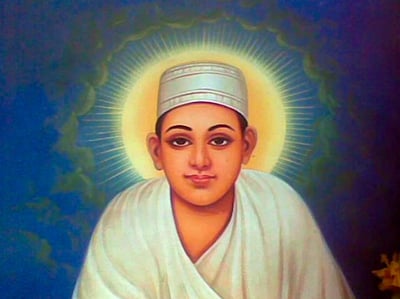Among the religious reformers and saint-poets who may have sprung from Kabir, Dadu’s name comes the foremost. Dadu was cotton cleaner by profession. He was born in 1544 in Ahmedabad of Brahmin parents who were merchants it seems. His fathers’ name was Lodi Ram. He lived during the end of Akbar’s reign and beginning of Jehangir’s reign.
Dadu Dayal was initiated by Kabir’s son Kamal, but there seems to be striking similarities between Dadu and Kabir. Both of them proclaimed equality of all men, developed a critical attitude towards orthodoxy, preached against the rigidity of caste system and denounced ritualism and all formal observances connected with religion. The views and teachings of both of them brought both Hindus and the Muslims together as followers. This is the reason why along with Kabir, Dadu was considered a great integrator in the Indian society.
When Dadu was twelve years old, he was removed to Sambhur in Ajmer. At the age of 18 Dadu travelled as far as Bengal, U.P. and Bihar. During his wanderings he realized that sectarianism in religion should be removed and this view is clearly in his literary compositions to propagate the message of equality of all for which he became famous. As Mr. R.L. Handa describes, Dadu’s songs which open with the words ‘Alakh Elahi Jagatguru Duja Koi Nahin’ reflects the deep realization of the equality of man and the worship of the formless ‘Brahma’ or ‘Nirguna’ form. Dadu had a revelation from heaven instructing him to lead a religious life. So he retired to the Vaherana mountain near Naraina and lost himself in meditation.
Dadu professed the same religious beliefs as Kabir and later like him he also led a domestic life. He had two sons, Garibdas and Maskindas and two daughters Nanibai and Matabai, all of whom in later life made their mark in the religious field.
Dadu was strongly influenced by the teachings of Kabir and Nanak, who had begun reforming the Hindu idolatory system and superstition. Dadu belonged to the Kabir school of thought. He also started the work of reform in North India. Dadu’s teachings brought strained feelings amongst those who held pedantic views on religion and adhered to ritualism. But with his humility and inimitable spirit of tolerance he won them over to his side. Dadu used to meet his followers every evening. He had by now a vast number of followers and while in Amber near Jaipur, he would hold Satsang, religious discussions and sing devotional songs daily.
Dadu’s name spread far and wide. It also reached the ears of Emperor Akbar, who asked him to visit Delhi. Dadu at first declined but later their meeting was fixed at Fatehpur Sikri. At the meeting a prolonged religious discourse ensued, spread over a period of nearly 40 days. Akbar was much impressed by Dadu’s views on religion and held him in great veneration. Legend has it that the poet saint Dadu led the Emperor Akbar blindfold to the temple of Vrindavan where Akbar had a vision of Lord Krishna. This also shows Akbar’s love for art and liberal views.
Dadu’s disciples are called Dadupanthis and they are divided into two classes. 1) The laymen who can marry and lead a householder’s life and follow a profession or a trade. 2) The priests who devote themselves to a religious life and to teaching the ‘Bani.’
Again, it is learnt Dadupanthis are of three sects:- the Viraktas, who go bare-headed and who have one cloth and one water-pot; the Nagas, who carry arms and are good soldiers; and the Vistar Dharis, who do the avocations of ordinary life. The followers of Dadu wear no peculiar frontal mark or necklace or beads. They carry a rosary and wear a peculiar sort of a cap – a round white cap with four corners and a flap hanging down behind.
The doctrines of the Dadupanthis are found in several Hindi books. Many passages from Kabir’s writings are also found included in these books. The sacred books of the Dadupanthis have much in common with Kabir’s writings. Dadu’s teachings are compiled in the Bani, a volume containing 5,000 ‘padas’ with 37 chapters, dealing with religious subjects like virtue,Truth, Faith and Prayer. He taught about man, God and Salvation. His hymns like those of the Sikh Gurus were also set to music and like them condemned idolatory, corrupt priesthood, caste system and ritualism. They are all singable and are characterized by religious depth and uncommon melodiousness.
The poetical compositions of Dadu, known as ‘sabdas’ or bhajans (songs) were written to preach the gospel of truth. His Bhajans and Kirtans (chorus) were so effective that many became his disciples,principal among them being Rajjab who took to religious life after hearing and participating in Dadu’s Kirtans.
Dadu reiterated “ I am not a Hindu nor a Mussalman. I belong to none of the six schools of pjilosophy. I love the merciful God.” His doctrine is clear from the hymn: “ I have found that God is unchangeable, immortal, fearless, self-existent, Almighty, pure, unimaged, unseen, infinite and incomprehensible. Worship is due to Him and Him alone.”
The most important view which he held was that all rebirths of man took place in man’s this life on earth itself and that he got his rewards or punishments in this life only according to his ‘karmas’ done in this life.
One of the beautiful sayings of Dadu is “As the opium-eater longs for the opium, the hero for war, the poor for wealth, so longs my soul for God.”
It is said Dadu retired to the Vaherana mountain and after sometime he disappeared. It is believed that he was absorbed in God. In Sambhar where Dadu had lived for some time, a monument in his name exists and where his sandals and clothes are still worshipped as relics. Dadu who spread the message of Bhakti or devotion to God all over North India, was a great saint, a great Bhakta, almost as celebrated as Kabir and Ramananda.









